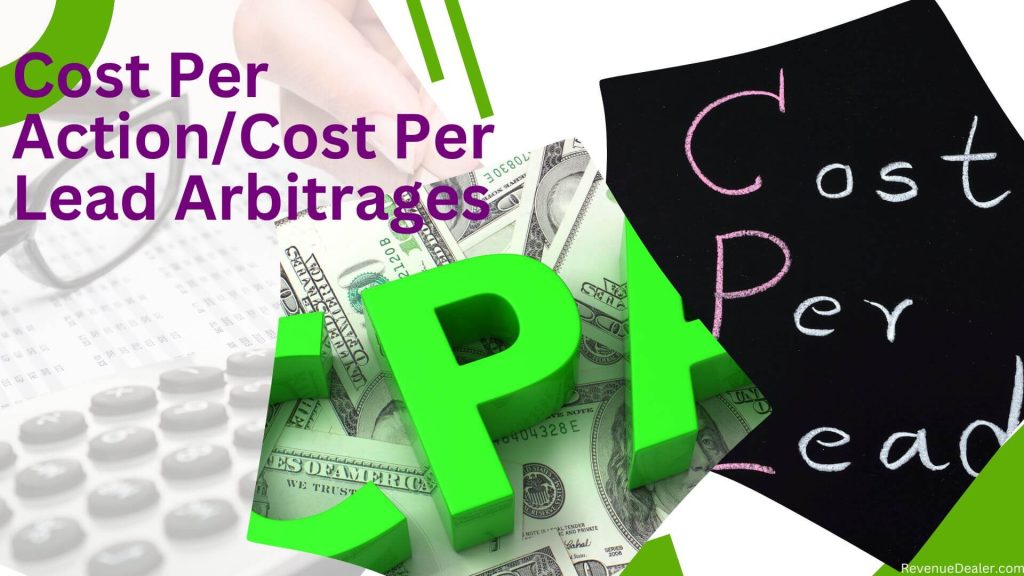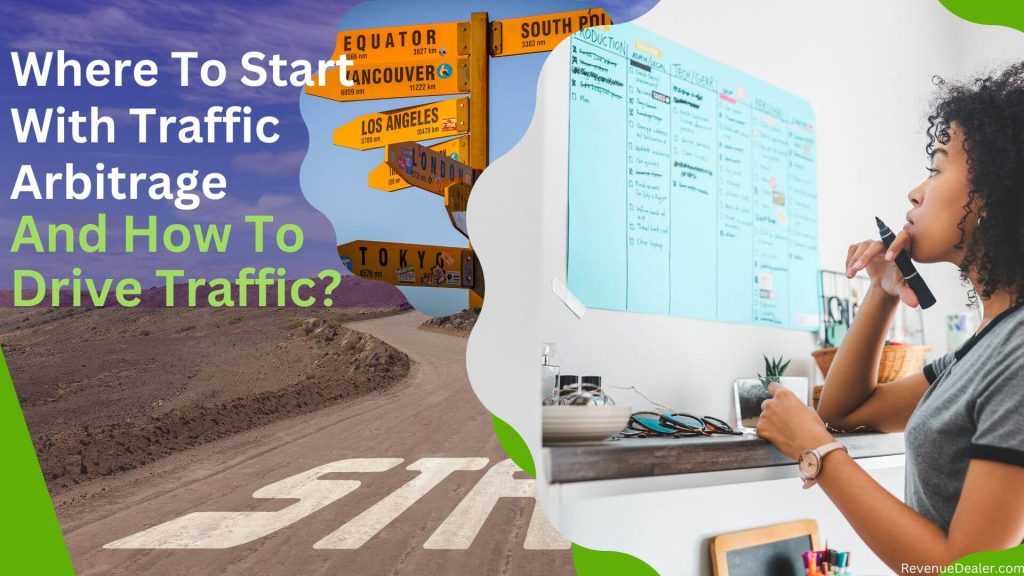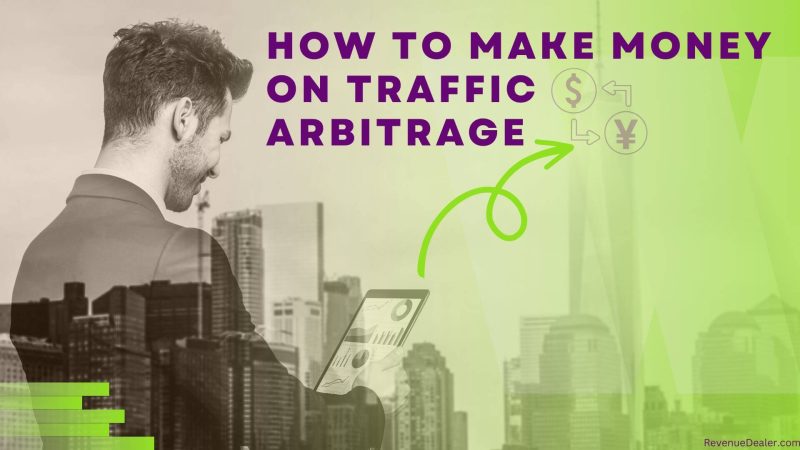Do you want to make some extra money and don’t know how? Are you looking for a new way of generating passive income? If so, look no further than traffic arbitrage! Traffic arbitrage is an excellent option for anyone interested in making money online with minimal effort and potentially high returns.
With the help of the Revenue Dealer complete guide, beginners will find everything they need to start their journey into the world of traffic arbitrage and all its lucrative possibilities!
What Is Traffic Arbitrage?
Traffic arbitrage is a business model where people purchase a large amount of website traffic to take advantage of its benefits. This business strategy allows individuals to acquire cheaper web traffic while monetizing it on other websites or platforms.
This type of tactic aims to maximize the profits made from visitors’ clicks and the subsequent revenue generated. Through traffic arbitrage, webmasters can effectively increase their online presence. Without spending too many resources on advertisement campaigns or SEO activities.
With careful execution of this system, businesses can see great returns with minimal investment – creating an efficient way to generate income and leverage growth potentials.
How Does Traffic Arbitrage Work?
Traffic arbitrage is a powerful form of marketing that involves leveraging existing website traffic for various purposes. This can be done by redirecting the visitor to a landing page to complete an action. Such as submitting their contact information or purchasing.
Additionally, this technique can acquire leads from competing sites or boost a website’s rank in search engine results pages. An optimized traffic arbitrage system requires thorough research on the competition and how visitors respond to different offers.
By testing different strategies, marketers can discover ways to maximize profits and increase ROI with this highly effective tactic.
What Are The Types Of Traffic Arbitrage?

There are four types of traffic arbitrage: CPC Arbitrage, CPA/CPL Arbitrage, PPC Arbitrage, and Ad Exchange Arbitrage.
CPC (Cost Per Click) Arbitrage
CPC (Cost Per Click) Arbitrage is an online advertising model. In which an advertiser pays for each click on their advertisement links. Appearing on an affiliate website or search engine result pages, such as Google Ads.
It’s commonly used for generating sales leads and boosting website visits. By driving targeted users to view the link content directly without visiting the advertiser’s website first. This type of arbitrage involves bidding on keywords with high demand but low cost per click (CPC). Making sure there will be potential profits when you resell this traffic at a higher price point than what you originally paid.
CPA (Cost Per Action)/CPL (Cost Per Lead) Arbitrages

CPA/CPL Arbitrages typically involve incentivized campaigns where affiliates pay “per action” or “per lead”. Instead of paying a flat fee every time someone clicks through their link for a product or offer being promoted.
With CPA/CPL campaigns, advertisers measure conversions not just from clicks. But from actual purchases made using those clicks. So they know who bought the product after clicking through your referral link versus. Who only read about it and then left without buying anything at all!
This type of arbitrage involves finding sources with inexpensive incentives suitable for your target market. Both within existing networks like Commission Junction and Traffic Junky, as well as exploring alternative methods. Such as self-hosted incentive programs outside these networks altogether. Before reselling them again at double cost to make ongoing profits over time!
PPC (Pay Per Click) Arbitrages
The PPC Arbitrages involve buying paid search engine visitor placements. Usually through Google Ads – to re-sell them later on another platform entirely. Thereby creating an instant profit margin between two different platforms, even if no one purchased anything from those ads!
PPC arbitrages often require thorough research into keyword trends & pricing metrics beforehand to maximize return value per dollar spent. They sometimes need testing multiple placement locations & bid amounts over test campaigns before moving onto larger budget ones. Yet can still yield impressive returns when done correctly due to their immediate transactional nature!
Also Read: Pay Per Call Affiliate Programs – Everything You Need To Know
Ad Exchange Arbitrages
Ad Exchange Arbitrages involve taking advantage of discrepancies between ad exchanges themselves. By leveraging programmatic ad buys across multiple exchange network providers simultaneously. Essentially allowing operators more flexibility in terms of price customization within specific audiences. While still taking full advantage of available options within each supply side opportunity offered by publishers registered with any given exchange network provider(s).
This type of arbitrage ultimately allows marketers even more data insights into respective user behavior patterns. While also providing ample opportunities to capitalize off lucrative discounts found across competitive bids submitted suddenly fluctuating inventory markets. Just like stocks & currencies do too – opening up avenues buyers would have previously been unable access until now!!
Who Participates In Traffic Arbitrage?

Generally speaking, there are three types of participants in the traffic arbitrage game. Entrepreneurs looking to capitalize on this relatively new source of revenue. Large companies who want access to cheaper and more reliable sources of online advertising inventory. And third parties who help facilitate this type of buying/selling process.
Entrepreneurs
Entrepreneurs interested in participating in traffic arbitrage can start their businesses or invest in already existing platforms that offer these services. They find sources for inexpensive ad inventory from publishers. Who may be looking for ways to monetize additional website visits. Which result from optimizing SEO rankings or running Pay Per Click campaigns.
Entrepreneurs then resell this ad space at higher markups than originally paid. Thus creating a profitable business model based solely on understanding how different channels interact with each other’s cost structures.
This can be done by hiring an agency that specializes in this field or using automated tools. Such as AdWords Optimizer Pro, which allow any user – regardless of technical knowledge – to take advantage of finding discounts and managing ad placements within different networks with ease.
Large companies
Large companies often purchase large amounts directly from publishers. So that they have cheaper access than going through intermediaries. Like agencies or technology platforms dedicated solely towards helping buyers purchase bulk amounts cost effectively. As bigger buys tend to come with lower margin requirements.
Due to discounts being offered for committing longer periods into contracts between seller/buyer relationships. Instead both sides searching for better conditions elsewhere every few months when deals expire (this insight helps explain why some big brand names you may see around consistently have been using same distributors since many years).
Third-party facilitators
Third-party facilitators are middlemen between sellers/buyers and are mainly used when dealing with high-value transactions. While also allowing advertisers extra protection against fraud. Similar type operations exist within not only the web but also physical world markets.
Such classic example being stock exchanges functioning over centuries without major disruptions. While allowing individual traders act among each other under fiduciary regulations protecting against false reporting & misrepresented assets transfers across borders spanning multiple states & countries simultaneously via unified code bases linked together. Throughout time globally ensuring no single entity owns entirety nor has control over other’s investments (as noticed recently during recent events surrounding ‘Libra coin’ project where too much power would lie under Facebook’s corporate umbrella).
How To Choose An Effective Vertical For Traffic Arbitrage?

Choosing an effective vertical for traffic arbitrage is key to running a successful online business. Here are some steps to guide you through the process:
Analyze Your Target Audience
The first step in choosing an effective vertical for traffic arbitrage is understanding your target audience. Who they are and what they want. Take the time to research your market, such as demographics, psychographics, and buying behaviors. So that you can identify potential niches that meet their needs. This analysis will enable you to build campaigns geared towards specific types of users. And increase conversions by targeting those more likely to become customers.
Define Your Goals
Before beginning any campaign, it’s important to know what results in you aim for with traffic arbitrage. Are you looking for quick short-term wins or long-term sustainable success? Be realistic about what kind of returns are achievable from each channel. Set achievable goals before starting any campaign so that it can be tailored around this figure from the outset.
Choose Platforms Wisely
It’s essential that when selecting platforms for an advertising campaign. All available options are considered carefully to determine which will provide the highest ROI (Return on Investment).
This could include social media networks. Such as Facebook Ads or Google Adwords, depending on your niche’s competitiveness, display ads through networks like AppNexus or Revcontent, or mobile app advertising campaigns via platforms.
Such as InMobi or Tapjoy – among many others! Whichever platform best meets your requirements should be chosen after careful consideration and outlined in detail before launching any campaign(s).
Understand Key Metrics & Trends
Knowing which metrics matter most can help ensure campaigns perform well over time; consider things like cost per click (CPC), click-through rate (CTR), and conversion rates over time rather than focusing solely on vanity metrics such as page views or impressions, etcetera.
These do not always give a complete picture! Understanding seasonal fluctuations across different industries is also essential to run successful campaigns all year round; this requires ongoing tracking, reviewing analytical data from past campaigns & making necessary course corrections where needed. Thanks again change seen within industry trends/structure, etcetera.
Utilize Automation Tools Where Possible
To ensure every possible optimization opportunity is noticed, it’s wise to use automation tools whenever practical; software programs allow marketers to analyze large amounts of data quickly and automatically set up testing scenarios across different channels to gather insights faster than manual methods ever would allow.
Ultimately, using modern-day technologies can save considerable money and resources while providing greater control over the overall costs of running a profitable online business empire.
Following these five steps should assist anybody looking to choose more effective vertical traffic arbitrage, further optimizing their chances of achieving profitable return scaleable online presence.
Where To Start With Traffic Arbitrage And How To Drive Traffic?

Traffic arbitrage, also known as traffic arbitraging or profit switching, is a way to earn money online by buying low-cost website traffic and reselling it at a higher price. It requires understanding the different web traffic sources and how to use them best.
When getting started in traffic arbitrage, the most important thing is having the right mindset. You need to think like an investor, not just a consumer – you are investing in website visitors for little cost with the hopes of making more money from those visitors.
To start with traffic arbitrage, there are two main steps: (1) finding sources of low-cost web traffic and (2) figuring out how to convert that web traffic into higher revenue streams.
One option for sourcing cheap web visitors is leveraging ad networks such as Google Ads or Facebook Ads, which offer great potential for scaling up your initiatives quickly if done correctly after thoroughly researching each network’s CPC rates and performance characteristics.
Other options include tapping into search engine optimization (SEO), engaging influencers on social media platforms such as YouTube and Twitter, running email campaigns targeting niche audiences, signing up with affiliate programs, or outsourcing certain tasks depending on the budget size or skill set availability of resources, etc.,
There are also some other no-cost tactics, including leveraging app reviews websites & installing video ads on popular sites & directories related to target audience topic preferences, etc.; these approaches create potential opportunities for driving website visits without significantly increasing costs upfront but may require additional investments in setting things up initially – so carefully analyze each before committing resources towards implementation if possible.
Once you have sourced the low-cost web visitors, then its time to look into ways to convert those leads into sales & profits via diversified monetization channels such as displaying advertisements across various platforms, e-commerce store setup showing services + products/content monetization via subscriptions/paywalls/clicks per view models/ affiliate offers+ partnerships, etc.
Depending upon end-user behavior captured from the earlier analysis step – user segmentation can be used for providing highly targeted messages regarding product offerings that suit their needs better, resulting in increased customer conversions – ultimately leading to increased revenues & lower bounce rates! So do an extensive research session before making any spending decisions here too!
In short, Traffic Arbitrage when managed accurately can be very lucrative indeed; however, it has its associated risks & complexities, which must be addressed by having the right processes integrated, best practices implemented, knowing legal rules around advertisement placements fully, especially concerning privacy policies faced frequently these days so use caution in order ensure campaign success while preparing plans keeping long term sustainability goals in mind simultaneously !!
Where To Sell Driven Traffic
Selling website traffic can be an effective way to increase revenue for a business or website. An ideal location to reach prospective buyers is the internet. Social media networks such as Facebook or Twitter, online ad-selling websites, and freelance marketplaces are all reliable sources of potential buyers.
For those looking for more specialized traffic, search engine optimization and pay-per-click advertising campaigns also offer unique and targeted audiences who could be interested in engaging with the site’s content or services. Whatever option is chosen, selling website traffic can be a great way to generate more income.
How Much Can I Earn With Traffic Arbitrage?

Traffic arbitrage can be a profitable way to increase your earnings. By capitalizing on differences in the price of web traffic from different sources, you can buy traffic from a low-cost source and resell it to a higher-cost one.
Your profit margins depend on the discrepancy between these prices, but with some savvy skill and knowledge, arbitrageurs have seen $200 to six-figure profits in as little as several months.
The key to successful traffic arbitrage is finding good deals on web traffic and reliable customers to purchase them reasonably. If you’re looking for an effective way to earn more money through online activities, look no further than traffic arbitrage.
Does Google Adsense Allow Traffic Arbitrage?
Traffic arbitrage can be an effective way to make money online, but it involves a certain risk. Google Adsense allows website owners to place ads on their webpage to make money from the site’s traffic. Does this mean that Google Adsense also allows for traffic arbitrage? The simple answer is no.
Google Adsense doesn’t allow for webpages to be created solely to send traffic to another website – even if the intent is to earn money doing so. While websites can redirect visitors, they must have substantial content and be viewable by visitors to qualify for participation in the Google Adsense platform.
So while some people may try to use this method to make money, it’s against the rules set by Google and could result in web pages and ads being removed from their platform.
Mistakes That You Have To Avoid As An Arbitrageur

As an arbitrageur, there are a few mistakes that you need to be aware of and actively avoid to ensure success.
Firstly, you must know the details of the market inside and out. It would be best to understand all the factors that affect prices in both markets before attempting any arbitrage opportunities.
This includes understanding how economic indicators, news events, and other market products may impact price movements on either side of your trades. Proper due diligence will help you successfully identify profitable opportunities and make more informed decisions when executing them.
Furthermore, it is key to remember to move slowly when engaging in arbitrage, as this can lead to significant losses due to mispricing or errors in calculation resulting from rushed deals or insufficient research. Patience is key here; buying at a lower price but selling at a higher one takes time, so trying to run through these steps without doing adequate homework can put your trading capital at risk if anything goes wrong.
In addition, failure to manage risk properly can have disastrous consequences for arbitragers as trades involve significant amounts of capital being exchanged between two markets which open you up for big losses should things go south unexpectedly or volatility increase drastically mid-trade.
Therefore traders must understand their potential risks before getting into any trade so they can adequately size positions/allocate funds accordingly while keeping an eye on liquidity levels (so there’s enough cash available for closing out transactions).
Finally – perhaps most importantly – don’t underestimate emotions when dealing with financial markets! Even experienced traders with information about complex derivatives products may be tempted by ‘gut feelings,’ which could take them away from analyzing data-driven strategies and putting together solid plans with reasonable estimated returns and manageable risks attached.
This cognitive bias often leads people astray from sound judgments and causes catastrophic losses; thus, staying focused on facts rather than feelings is paramount for successful trading!
Bottom Line
Put your traffic to work by tapping into the lucrative world of affiliate arbitrage! Millions are cashing in with this method, but it requires patience as you start. Keep yourself manageable – test campaigns and pick programs from trusted sources like Revenue Dealer, with plenty of great options. Be part of our team and start making money today!









